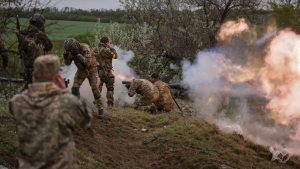Audio Version Of The Blog – 5/29/22
Listen to an Audio Version of the Blog
Download:MP3 Audio

Listen to an Audio Version of the Blog
Download:MP3 Audio
 Mutual guarantee means that we completely depend on each other, as if we are sitting in a boat in the middle of the sea at risk of drowning in our egoism and finishing our lives in this way. If we want to reach the shore, we must stick together so that everyone helps the other.
Mutual guarantee means that we completely depend on each other, as if we are sitting in a boat in the middle of the sea at risk of drowning in our egoism and finishing our lives in this way. If we want to reach the shore, we must stick together so that everyone helps the other.
No one will come to our aid from the outside until we help each other ourselves. Therefore, we must feel that we are in the same boat under the threat of dying. Only if we help each other get out of the ocean of common egoism surrounding us from all sides, can we be saved.
Imagine yourself in a boat in the middle of a raging egoistic sea. If we support each other, then the sea, with its inner force (the force of the Creator), will take our boat ashore.
The people of Israel were assembled from representatives of all seventy nations of the world to serve as an example of mutual guarantee for everyone else. This group has become a small kernel of connection within the entire vast humanity. The whole history of humanity forces the people of Israel to disperse around the globe in order to convey this message to humanity through philosophy, science, and most importantly, religion.
We are yet to reveal that only this force operates in the world and controls it from the center of reality. Now we are approaching the final stage of this development; it depends only on us whether we will reach it the easy way or through great suffering, problems, and wars.
The entirety of humanity has reached a state when it is ready to listen to the issue of mutual guarantee. Every day we feel more and more how connected we are with each other, so much so that it is impossible to separate us. All nations, countries, and governments are trying to somehow single out and isolate themselves, but nothing will work. We only plunge ourselves into suffering, through which we will understand more clearly that we are tightly connected and can achieve success only through mutual guarantee.
Otherwise, the world will not calm down. It will experience wars and difficult scrutiny. Someday, however, after many years of suffering and problems, we will realize that everyone depends on everyone, and there is no other force capable of governing us except the force of mutual guarantee.
All of humanity is in one small boat in the middle of a big raging sea. If we do not recognize our mutual responsibility, we will plunge ourselves into great troubles. Of course, in the end, we will decide that we are obliged to be in mutual guarantee.
Today, no country in the world can exist without connection with other countries. And it would be desirable for these connections to be positive. After all, bad connection causes troubles to others, and boomerangs back to you. Only through some human, normal agreements is it possible to come to peace.
Thus, we will learn that only mutual care and mutual guarantee can lead us to a good life. Then we will discover that there is another goal—to acknowledge the global force that operates in the world. It is impossible to govern the world without knowing this basic law of loving one’s neighbor as oneself.
This is no longer a simple caring for each other, but complete rejection of the egoistic approach. Instead of foreign ministers helping each country take care of itself, there will be other ministers taking care of the connection between everyone and its mutuality. After all, we will not be able to exist otherwise.
This will lead us to the need to study the laws of mutual guarantee, that is, the laws of the true reality. We live at a time when for the first time the world feels its integral dependence, interconnectedness, and therefore, responsibility to each other. No one has the right to do what he wants, regardless of others. After all, we see what this leads to. Everyone has to take the entire world into account.
This is how we come closer to the truth, which is not found in any country, in any government, or in any person. The truth is above us, and it lies in the good connection from each person to all people.
[298214]
From the 2nd part of the Daily Kabbalah Lesson 5/26/22, Baal HaSulam, “The Arvut,” (Mutual Guarantee)
Related Material:
Precious Flower
Mutual Guarantee For The Connection Between Us
Mutual Guarantee—The Property Of Mutual Concern
 Michael Laitman, On Quora: “What are your solutions to the overconsumption problem?“
Michael Laitman, On Quora: “What are your solutions to the overconsumption problem?“
We need balance between us and nature.
We need to take care of our necessities—to kill animals for food, and burn coal, oil and gas in order to reasonably use mechanisms, equipment and heating. We cannot avoid doing so. We also need to use water wisely in an adequate measure. When we throw half of what we produce back into the ocean, which generates a lot of excess dirt and garbage, then we will naturally find ourselves drowning in such excess.
Yet, such a process is in the hands of those who greedily or foolishly try to produce and earn as much as possible, discarding whatever is unused while people around them keep quiet. It has become an unstoppable process, and it turns out that half of whatever we produce in the world today is unnecessary.
The solution is to work out what is necessary and unnecessary in our lives. By doing so, we would stop about 70 to 80 percent of our production.
Moreover, the issue of working out what is necessary and unnecessary can be approached logically. Even though we are unaware of several conditions, it is still possible to exercise this approach. For instance, economists have already calculated and estimated what it means to fulfill people’s needs. But is there anyone who takes that into account? Are there people who care about everyone having enough, with no more than what is truly needed?
Nonetheless, it is a starting point: to calculate what is necessary and unnecessary in our lives.
However, there is a major problem: human nature—the egoistic desire to enjoy at the expense of others, which wishes to place oneself over others—demanding its sustenance. And the problem is in the ego always wanting to outperform others, to be better off than them. So we can work out our necessities and surpluses all that we like, but in the end, the ego will constantly want more and more, to be above one’s neighbor and to have more than them.
Therefore, together with working out what is necessary and unnecessary in our lives, and providing for our necessities, we also need a more comprehensive educational approach that shows us how our egoistic nature operates, where it is leading us, and how we can rise above its influence by connecting to each other in a common giving intention. By working out our needs, taking care of them, together with the regular learning and implementation of positive connection in human society, we would be able to solve the problems of overconsumption and overproduction, and would find that we would be able to live comfortably and happily with about 70 to 80 percent less than what we currently produce, buy and throw away.

Based on the video “How to Deal With Overconsumption and Overproduction” with Kabbalist Dr. Michael Laitman and Semion Vinokur. Written/edited by students of Kabbalist Dr. Michael Laitman.
 Michael Laitman, On Quora: “What is a meaningful interaction?“
Michael Laitman, On Quora: “What is a meaningful interaction?“
A meaningful interaction is any interaction where we consider:
Why is it happening?
What is its source?
What is the desired outcome?
By relating as such to our interactions, we would start moving in a direction where we start thinking that every person, animal, plant and object has its place and time.
The world is hidden from us, and it reveals itself to us one interaction at a time. These interactions are imaginary forms that exist solely in our perception and we make them meaningful by organizing our attitude toward this movie that is playing at every moment, i.e. toward the world.

Based on the video “What Is a Meaningful Interaction?” with Kabbalist Dr. Michael Laitman, Yael Leshed-Harel and Oren Levi. Written/edited by students of Kabbalist Dr. Michael Laitman.
Photo by Timon Studler on Unsplash

Michael Laitman, On The Times of Israel: “America’s Division, Not Guns, Is Its Most Dangerous Weapon”
America is once again trying to make sense out of the tragedy of yet another deadly mass school shooting. The lives of 19 children and two teachers were cut short by an 18-year-old gunman who attacked a classroom at Robb Elementary School in Uvalde, Texas. Everyone is asking when will this madness stop? The answer requires a broader approach than gun control. It should penetrate deeper layers of the social fabric and move toward cohesion.
The most recent rampage occurred just days after a white, far-right youth killed ten people in a supermarket in Buffalo, NY. The Texas shooting, perpetrated by a teen of Hispanic descent, is the deadliest school massacre in the US since the Sandy Hook shooting ten years ago that killed 20 children and six adults in Newtown (CT). The incident is ammunition firing up the debate in America over the Second Amendment right to keep and bear arms. Both President Biden and former President Obama accuse the gun lobby of opposing the regulations.
The mass shootings in the United States will not be solved until the root of the problem is addressed, and that is not gun control. Even though it is obvious that gun sales should be monitored, I do not believe that it will stop the bleeding in America. Even if there were regulations, it would still be possible to buy guns on the street. On the other hand, violence cannot be prevented if everyone carries a gun. It will be safe only if absolutely no one has a gun, but that is just an illusory reality.
So, America is not facing a gun problem, it is facing a social epidemic. The US is an extremely and increasingly divided country. There are too many factions, divisions, and interests within the population that clash in education, culture, temperament, religion, with tendencies to live opposed to each other.
Conversely, the more homogeneous a society is, the more it neutralizes and prevents individuals from heating up and aggressing others. But in America today, the opposite is true. In US society, people do not understand, empathize with, care about, or even tolerate each other. They have little patience with their neighbors, they do not want or even ask favors from others. Everyone wants to stand alone, as far away from each other as possible.
Has someone fallen down in the middle of the street in a big city? No one cares about that. No one owes anyone anything because there is no sense of belonging. Other countries have a relatively uniform social fabric, but in a deeply individualistic society like America’s, diversity has a particularly hard time.
In children and adolescents, it is many times more amplified. They absorb the tensions between different types of people, charged with the latent anger between the descendants from the English and the Germans, the Irish and the Africans, which has existed since the founding of the United States. The Latinos, and each penultimate group who immigrated to America can also display brutal outbursts.
In such a social climate, it is easy for a boy who does not agree with any idea or opposes some position to take a machine gun and go out and settle his scores with the lives of innocent people. This is his way of showing everyone how much he hates the society in which he lives.
Therefore, addressing the epidemic of gun violence in schools and anywhere else goes beyond laws and regulations. America must address the deep cultural and social conditioning that produced these events by initiating an educational program to teach its children new examples, norms, and values. A school should feel like a supportive community, not a place where they must compete mercilessly while struggling for social acceptance.
American society needs to be thoroughly taught how to replace street-level carelessness with feelings of consideration, mutual caring, and cooperation. Through workshops, discussion groups, and joint projects, they should be regularly trained to cooperate, build trust, and develop their social sensitivity to one another.
This is achievable. Just one comprehensive educational step can truly wash over America by leveraging the creativity it is capable of through Hollywood movies, riveting TV shows, and proper media content. It would help to guide everyone from an early age about how to act in situations where anger arises, how to lock it down with a strong, inner bolt, and how to prevent anger from erupting to the point of killing. When America has had enough of senseless bloodshed, it will be ready to move beyond failed attempts at remedying the symptoms and it can take truly meaningful steps to prevent violence through social reform.
[298274]
Medium published my new article “What Can Make Us Caring”

May 9, 2022 — Orlando, Florida, United States — Baby formula is displayed on a shelf at a Walgreens pharmacy on May 9, 2022 in Orlando, Florida. Stores across the United States have been struggling to stock enough baby formula, causing some chains, such as Walgreens and CVS to limit customer purchases. While manufacturers report that they are producing at full capacity, it’s still not sufficient to meet the current demand caused by supply chain issues and product recalls. (Photo by Paul Hennessy/NurPhoto) Reuters
The events of the past few months, and in fact, the past few years, teach us a very important lesson: If we want to survive, we must learn from nature how to do it, since if we follow our own ideas, we will continue the march of folly until we destroy human civilization and our planet. When we look at nature, there is one law that weaves all its parts together into a perfect tapestry: balance and collaboration. That law is exactly what we humans do not abide by in our own society. Instead of balance, we strive for prominence at the expense of others, and swap collaboration with exploitation. If we keep this up, we are on our way to extinction.
I am not saying that we must love one another or even care for one another all at once. However, we must know nature’s laws and what happens when we break them. Since we are currently acting contrary to the law of balance and collaboration, we must also know the consequences, the penalty, if you will, for breaking it.
We are already feeling some of the consequences of our ignorance and vanity. Food shortages are worsening around the world, and hunger has become a real peril in places that have not known it for centuries. Gas shortages are also hampering production and causing energy insecurity in western, leading OECD countries, and the overall atmosphere is that hard days are coming.
Indeed, it is only the beginning. According to pundits, we are looking into years of deprivation and scarcity.
But there is no real reason for it. No natural disaster has hindered humanity’s ability to produce abundant food or ample gas and oil. It is we humans who are inflicting these deficiencies for the sole purpose of crushing one another. Nothing guides our moves but hate, and hate destroys everything, including, ultimately, the hater.
Because everything we do stems from the motivation to defeat and vanquish others, nothing we do succeeds. When one effort fails, we move on to another, but it, too, is bound to fail for the exact same reason: our foul intentions toward others.
How, then, can we change our nature? What can make us care for others? To do that, we first need to acknowledge the truth about our own nature, and then we can begin to nurture a new one within us. What all other beings do instinctively — follow the law of balance and collaboration — we can accomplish only if we choose it consciously. The way to do this is by realizing that we are made inherently opposite from this law, and then carefully examine each and every aspect of our lives, and adjust it to work according to that law.
It may seem unfair that only humans have to learn this law the hard way, but there is a great reward at the end of the process. Since humans are the only ones who have to go through the learning process, we are also the only ones who will reap the reward.
When we learn about human nature and the nature of the rest of reality, we begin to compare them. As a result, we gradually learn to value the law of balance and collaboration. We understand much deeper than any being since we have something to compare it to, a negative image of the law, and its palpable consequences. When we begin to act according to the law of balance and collaboration, it is because we made a conscious choice to do so after learning about our own nature and choosing to shun it and adopt a new, more inclusive and cooperative nature.
For us, then, learning to care about others is not an instinctive process, but a profound process of deepening consciousness, and choosing care and connection over alienation and exploitation every step of the way. This is the real advantage of man over beast — the gift of consciousness. However, we earn it only after having chosen balance over superiority, and collaboration over exploitation.
The painful process that humanity is undergoing will ultimately lead us to make that choice. However, awareness can shorten the process and make it much easier and quicker. The sooner we understand that all our troubles stem from our malice and cruelty toward each other, the sooner we will open our eyes and realize that there is another option. Then, the sooner we choose the option of balance and collaboration, the sooner our troubles will end and peace will begin.
My new article on Linkedin “The Folly of the Battle for Seniority”

Whether it is a war between tribes in Africa or between countries in Europe, every war begins with an ideological dispute, which then translates into a military conflict. The same goes for the current war in eastern Europe.
The ideological question at the heart of the collision between Russia and Ukraine is far deeper than a territorial dispute; it is a war over establishing “my place in the world.” Russia claims that it was there first and the Ukrainians hardly deserve the title of “nation.” Ukrainians, on the other hand, assert that it is to the contrary, and they are in fact the elder nation. Historians will keep contending over who is right for a long time coming, and they will probably never agree.
We Jews, however, know only one thing for certain: Seniority does not matter. Although we are one of the most ancient peoples on the planet, and although we are the “root” of two religions that have spread throughout the world—Christianity and Islam—and of countless philosophies and teachings, it gives us no preference or favor in the eyes of the world.
In fact, we should be the first to point out the futility of fussing over seniority. Instead, we should stress that the family of nations should be more like a real family. In a family, some children are born earlier and some later, but they are still siblings, not enemies, and there are love and mutual support between them. As in a family, the elder siblings should not feel superior, but rather responsible for the wholeness and well-being of the family.
Seniority should mean a higher level of development. Yet, nothing is more primitive (and foolish) than using seniority to demand prerogatives. The fact that I came first gives me no right to patronize others. On the contrary, it makes me responsible for them.
A military parade showing off tanks and missiles is no more civilized than a war dance with arrows and spears. Both are equally primitive. However, in the case of the war dance, there are no pretensions, while in the case of the military parade, it professes to show progress. In fact, it displays only man’s hyper-developed brutality and egomania.
Instead of warring over superiority, we should understand that we are worthy only when we unite above the differences, just like a family is a good family only when all its members are united and care for one another. The differences between us do not threaten us; they complement our weaknesses and help us achieve what we would be unable to achieve otherwise.
Just as complementarity is the basis of balance in nature, it should be the basis of human society. If we used each other’s qualities for the common good, we would all benefit from our uniqueness. We would value and care for each other precisely because we are so different.
Civilization is headed toward complementarity, not particularity. Today, those who patronize others will not succeed. It is simply the time in our evolution to correct the family of nations and begin to function like a good and caring family.
[298302]
My new article on Linkedin “AI, Draw the Love between a Flower and a Bee”

There has been a buzz lately about Artificial Intelligence (AI) machines such as Dall-E 2 or Google’s Imagen creating realistic looking images of completely unrealistic scenes by describing the desired image in words. For example, if you want a picture of a giant cobra made of corn slithering on Mars, or a human palm with leaves growing from its fingers, simply type the phrase into the machine and there you have it.
Following the accolades there come the questions. Will it threaten the livelihood of artists? Will it make photographers obsolete? Will graphic designers become a thing of the past? This is how we operate, judging everything in terms of what is good for me, as if we can stop the world’s progress if we disagree with it.
We have tried to stop many technologies that are far more ruinous than artificial artistic images. It has never worked. We could not stop the making of nuclear weapons or the production of killer drones, and we will not be able to stop the development of AI in general, and AI art in particular. Nor is there any need to stop it. Instead, we should try to see how innovations can fit into our lives and improve them.
Technology is advancing along with our aspirations for self-expression. In other words, it is not technology itself that is advancing, but humankind. Because of it, trying to hinder the advancement of technology means trying to impede the advancement of humanity. This goes against nature, and it will never lead to positive results.
Technology is a raw material. Just as a sculptor might use a rock to chisel out an image, or a musician would use a musical instrument to create music, AI is the instrument that creates the artist’s creation. The only question is what kind of art we want to create.
If I were to use this kind of art, I would try to create spiritual art, one that shows the hidden connections between different elements in nature. If we could show how everything is connected and dependent on the well-being of everything else, we would relate to the environment and to other people very differently from the way we do today.
For example, I would ask the machine to draw the love between a flower and a bee. Not a flower and a bee, but the love they feel for one another. Because they do, except we do not feel it (for the most part). The relationship between the bee, which needs the flower’s nectar to feed herself and her young, and the flower, which needs the bee to pollinate and reproduce, is a symbiotic relationship that involves two very different levels of nature—the animate and the vegetative. Because of it, the two are deeply connected and feel close to one another.
If we could show how everything is connected in this way, we would be able to sympathize with all of nature and with all the people, feel connected to them, and develop affection for all things and all people. If we could do that, we would not need to worry about limiting the development of potentially injurious innovations, since the affection between us would guarantee that we use everything only to benefit everyone, and never to harm them.
Medium published my new article “Between Pain and Forgiveness”

When we are hurt by others, it hurts terribly, and it can happen in our lives at any moment. Questions immediately arise: When is there room for forgiveness and what is it anyway?
It is human nature to enjoy, to satisfy ourselves with all kinds of things that seem good to us. We want to enjoy food, sex, family, money, honor, control, information, and a combination of these above all. We constantly work to fulfill our desires, and consider how much energy we should invest in something specific depending on the expected outcome.
To illustrate, let us say we want to buy a nice suit for a particularly festive occasion. We invest a large amount of money in it, equivalent to almost a week’s work, and purchased it with great pleasure. The long-awaited day arrives, we put on the new suit and walk around among everyone with a smile from ear to ear. People say, “What a great suit.” The chest swells with pride.
And suddenly someone utters in front of everyone, “What’s that funny suit you are wearing? What kind of costume is that?” And from that moment on, reality changes. Everyone giggles, and we are filled with shame.
Later that evening, we run into the same person again, who quietly tells us, “Sorry if I said something inappropriate earlier.” Immediately we respond with a rejection. Is such a request for forgiveness a reparation for the harm done? Certainly not. That is why we do not accept it.
Real forgiveness should have been one that compensates me for the large sum I invested in buying the suit, for all the expectations I had of receiving compliments, respect and recognition, hopes that were replaced by contempt, ridicule and shame. For all the things that have accumulated in me, I need proper compensation.
The reparation can be made through revenge, as it is usually done, or alternatively by the person in question coming to me with a sincere apology and convincing me that he or she understands the damage and terrible insult caused to me. Let’s say the person writes a check that would cover the purchase of ten more suits, for example. In that case, if I feel that the apology is indeed sincere, and the check also seems respectable enough to me, then I am willing to forgive, to erase the case as if it had not happened.
In principle, the size of the blow is the size of the compensation that can cover it. Forgiveness, revenge, slight, insult, investment, these are all things measured only in relation to my egoic desire to enjoy. If the ego still feels hurt and demands revenge, it means that the place of hurt has not been filled with proper compensation. The pit that opens up in the heart is still open, so we cannot truly forgive.
Until now, we have analyzed phenomena that we all know. At some point, a feeling may arise in a person in which the desire for revenge, of seeking honor, of fights for control and wars — become extremely exhausting to us. It destroys our health, our relationships, our whole lives. “What do I get out of all this,” we begin to ask ourselves, “What is it worth living for? Is this my mission in life, is this all I have to do?”
The awakening of these inner questions brings us to a quest for inner development, a method of overcoming the limitations of the egoistic nature. This wisdom teaches that the great purpose of our existence on earth is to discover the universal power of nature, the quality of love and giving, and it is discovered by acquiring a similar quality to it. This revelation is called spiritual because it elevates every human being to a higher, eternal and complete level of existence.
How does it happen? Broadly speaking, by developing loving relationships in a small group that serves as a laboratory, we complement each other in ways that we cannot achieve alone. We learn to connect with each other in harmony, like different organs in a body. Injury, reparation, revenge, forgiveness, all these games lose their meaning because we understand that we are not fighting against each other, but we all together raise above our narrow calculations in the face of our common egoistic nature.
When I realize that I have hurt someone, I go directly to the person and ask him or her what I can do to make amends for what I have spoiled. To get closer to him or her, to connect with the person and do everything I can to restore the power of love between us. And if someone has hurt me, I remember that it is not his or her fault, but the human ego, and try to help the person rise above it. In this way, we gradually approach a situation where our world becomes a place where it is fun to live. With the highest power of nature, in reciprocity, support and trust.
[298231]

Michael Laitman, On The Times of Israel: “Why Advanced Nations Become Antisemitic”
What do the Babylonian Empire, ancient Rome, 13th century England, 15th century Spain, and 20th century Germany have in common? All of them were among the most, if not the most advanced nations of their time, and they all tormented the Jews or altogether eliminated them. Even more interestingly, they all turned on the Jews when they were in their prime. Why are we, the Jewish people, always blamed for all the woes? Why are we attacked, and why do the most vicious attacks come from the most advanced nations? To answer these questions, we need to know our place in the world and our obligation to humanity.
The more chaotic the world becomes, the more it turns against the Jews. Jews are always blamed for things that go wrong. When adversity becomes too much to bear, the frustration erupts against the Jews.
We Jews always feel that it is unjust that we should be blamed for things we did not do, but this does not change the world’s opinion, and for a good reason. Without realizing it, the world is not really accusing us of doing harm, even though some make up various libels. In truth, the world is accusing us of not doing what we should be doing, which is what we did for ourselves when we became a nation: unite our warring hearts.
Especially today, when every problem—even as minor as monkeypox—spreads around the world and becomes a global problem, it is manifestly clear that only worldwide mutual responsibility can help us overcome the world’s problems. In the absence of mutual responsibility, humanity tries various makeshift solutions, which ultimately only aggravate the problems. Everyone knows that if we could only work together, humanity would overcome every problem, but we cannot bring ourselves to cooperate, and so we are forced to improvise and ultimately fail.
The ancient people of Israel, whose founding fathers came from a variety of (often hostile) tribes, had found a way to unite against all odds. They realized that unity was the most important asset for society and made all other values secondary. They taught this to each other, they taught this to their children, who taught their children’s children, until they had become a new nation bound not by blood relations but by the value of unity.
No other nation had been born this way before or since, and no other nation has managed to forge such a bond among its members. The people of Israel, for their part, became responsible for sharing their unique method of building nations that live in peace with one another and among themselves. The early Jews were well aware of their commitment, but since the last exile, two millennia ago, they had forgotten it. The world, however, still remembers that the Jews hold a special secret that they are denying it. This is the reason for the world’s perpetual resentment against the Jews.
Moreover, the more advanced a nation is, the more difficult it is for its people to maintain solidarity, and the more they need the ancient Hebrews’ method for achieving unity. If we examine the legacy of the ancient Jews, we will find that it is not the love of knowledge or the zest for power, but the motto “Love your neighbor as yourself.” Because solidarity is such a rarity in advanced nations, these nations become the most resentful toward Jews and blame them for their troubles.
While this is true of advanced countries, it is also true in general, that when any adversity comes upon a nation, it comes because of one core reason: lack of cohesion, lack of solidarity, or in other words, lack of unity. At that time, the nation’s people feel that it is the Jews who are behind it. They cannot articulate why they think so, but they do nonetheless. However, the fact that they blame us for their adversity necessarily implies that they believe in our ability to prevent it. Indeed, if we taught them how to unite the way our founding fathers had united, they would not fall into their sorry state. This is why they hate us.
Therefore, if we want the world to stop hating us, we must help correct the world by learning how to unite. To do this, we ourselves must unite above our divisions, just as our ancestors did when we first became a nation. Once we achieve this, we will become the example of unity that the world wants to see in us. We can walk in circles for centuries to come, but it will not change the fact that until we unite among us and set an example of unity to the world, the world will remain mired in wars, blame us for them, and beat us up as punishment.
[298237]